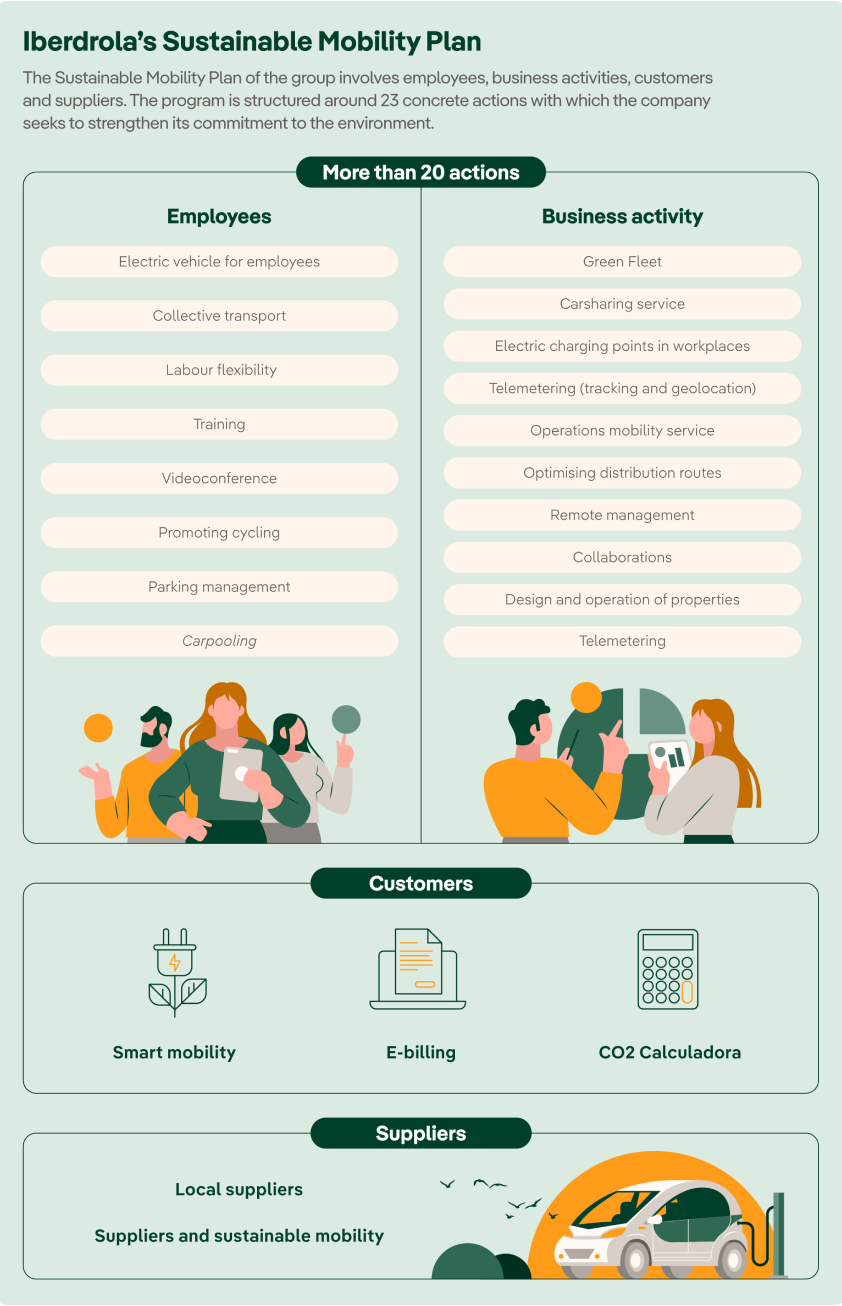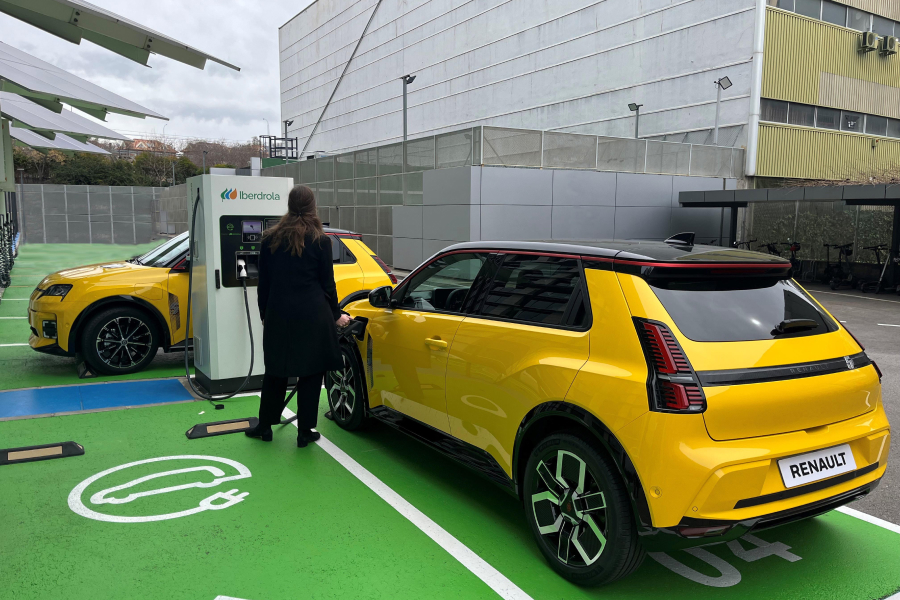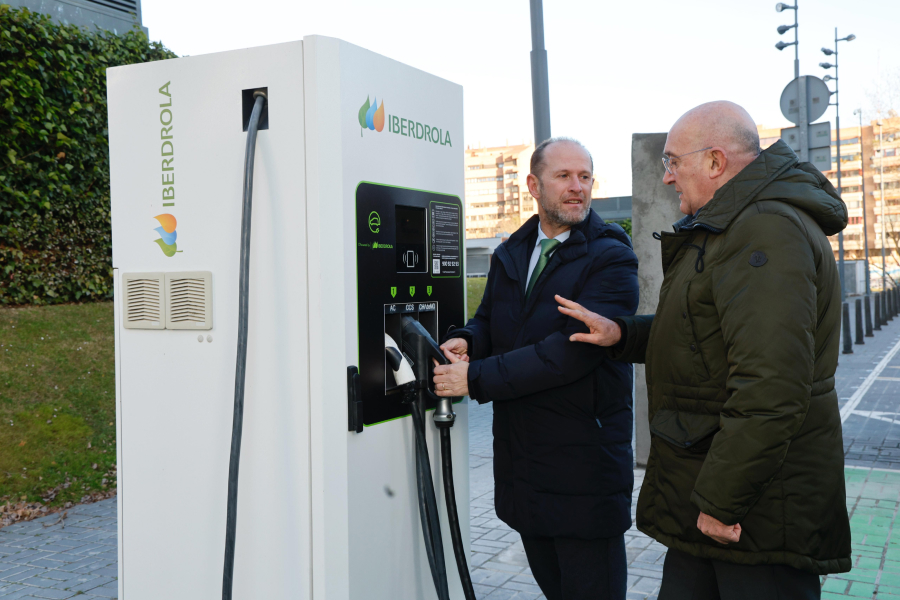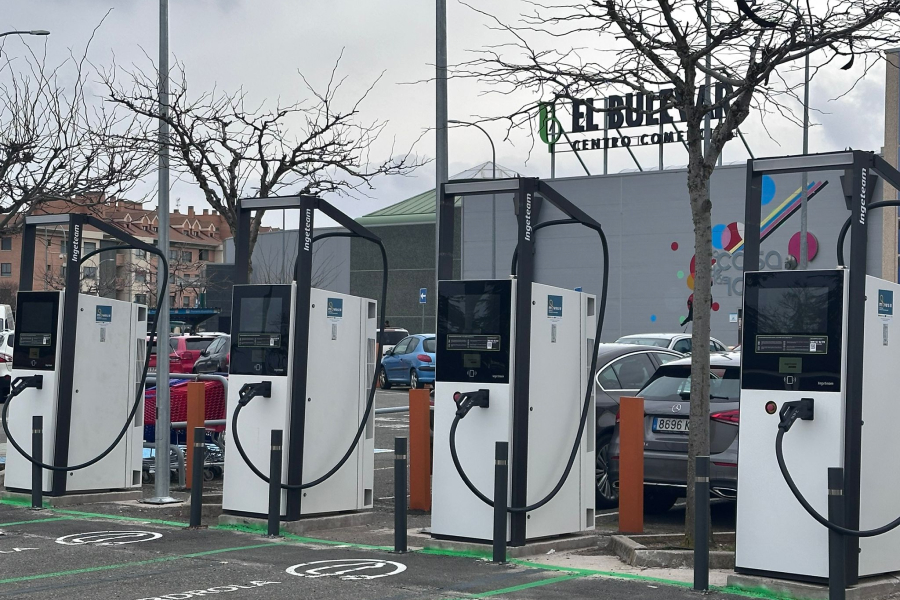SUSTAINABLE MOBILITY IN SPAIN
We lead the energy transition in Spain through the development of policies and actions to promote sustainable mobility
At Iberdrola España it is clear to us that the energy transition involves the use of more sustainable mobility. The decarbonisation of the sector, which is responsible for 25% of Spanish CO2 emissions, is key to the fight against climate change. At Iberdrola España, we not only offer sustainable energy solutions to our customers, but we also lead by example with the development of policies and actions that we apply throughout the company.
The Sustainable Mobility Plan in Spain

Advantages of sustainable mobility
Sustainable mobility is all mobility that focuses on environmentally friendly forms of transport. One can, for example, travel on foot, by bicycle or electric car if one wants to avoid using fossil fuels, or one can reduce emissions by travelling by public transport or driving more efficiently when using a combustion vehicle. The benefits of using sustainable mobility, however, are not limited to environmental benefits. Here we show you how you can benefit from opting for greener forms of transport:
- Health. Cycling or walking can help you to achieve the minimum 150 minutes of moderate aerobic physical activity recommended by the WHO per week . Particularly when the journey is short, it is advisable to opt for these forms of transport.
- Savings. All forms of transport are good for the environment and good for your wallet. Walking is free, and using a bicycle, public transport or an electric car is significantly cheaper than using a traditional vehicle.
- Noise. When it comes to transport, reducing CO2 emissions also means reducing noise pollution: more sustainable means of transport are also quieter than combustion vehicles. Your neighbours will appreciate it if you opt for more environmentally friendly forms of transport whenever possible.
- Safety. The public transport is safer than the private car , and the risk of having an accident on a bicycle is also lower than in a car . The most environmentally friendly transport option is often also the safest.
- Simplicity. If you want to avoid trips to the garage, you can opt for means of transport that do not require complicated maintenance. Bicycles and electric vehicles are much easier to maintain than combustion vehicles, and if you travel on foot or by public transport, you won't have to spend time or money on vehicle maintenance.
- Tax incentives. In Spain, opting for electric vehicles brings tax benefits. The Moves II and Moves III plans are examples of aid that the Spanish government has implemented to encourage the use of zero-emission vehicles
Smart Mobility PLAN
If you want to contribute to the reduction of CO2 emissions without giving up the comfort of the car, electric cars may be the best option for you. Through our distributor, Iberdrola Spain has a Smart Mobility Plan that will help you in your transition towards sustainable mobility. If you are looking for an electric charger, have an electric vehicle and want an efficient plan that allows you to make savings, or simply want to find out more about electric vehicles, you can find what you are looking for in our plans.
Iberdrola Spain's Smart Mobility Plan also includes the implementation of at least one fast charging station every 50 km on the country's main roads. Thanks to this initiative, which has received a green loan of €59.4 million from the Official Credit Institute (ICO) and a grant of €13 million from the European Commission, Spaniards will be able to travel the entire country in electric vehicles.
Main agreements for sustainable mobility in Spain
Iberdrola Spain has also signed various agreements with vehicle manufacturers and dealers to promote sustainable mobility. For example, it has joined forces with the BNP Paribas Group to revolutionise the leasing market in Spain with an agreement designed for individuals and companies that seeks to integrate electric vehicle leasing through the Arval service and the installation of the charging point financed by BNP Paribas into a single offer. It is a solution capable of electrifying one of the transport sectors with the greatest expected growth in the coming years: that related to the delivery of online commerce.
It also plays a leading role in three of the macro-projects presented so far in the country to the calls for European Next Generation funds for the development of electric mobility. These are the so-called Strategic Projects for Economic Recovery and Transformation with the aim of developing the Electric and Connected Vehicle (PERTE VEC).
On the one hand, the company participates in the Future: Fast Forward consortium, led by SEAT and the Volkswagen Group and made up of 62 companies covering the entire electric vehicle value chain. Iberdrola Spain's contribution to the project focuses on the decarbonisation of the SEAT factories in Martorell (Barcelona) and Volkswagen in Pamplona (Navarra); the development of photovoltaic self-consumption projects for these factories, and the development of innovative smart charging solutions and testing of uses for the second-life batteries of electric vehicles.
Similarly, the company has become the energy partner of the CAPITAL project, registered by the Irizar Group within an alliance of 21 companies, which will make an investment of more than €63 million for a new generation of sustainable vehicles.
Finally, Iberdrola Spain has also joined forces with Renault to try to transform mobility in Spain with a proposal that includes 31 initiatives around three axes: decarbonisation, connectivity and mobility as a service.
Meanwhile, in Elche (Alicante), Iberdrola España has inaugurated one of the largest ultra-fast charging hubs for electric vehicles that currently exist in southern Europe. The infrastructure, carried out in collaboration with Porsche, has a total of four 400 kW chargers and another twelve 200 kW chargers with the possibility of charging up to 16 vehicles simultaneously and the capacity to charge the battery of an electric car in less than five minutes.
Iberdrola España's commitment to sustainable mobility also includes electric motorbikes. Together with Cooltra and Inetum, the company has installed smart charging stations, each capable of housing 20 chargers and multi-brand motorbike batteries, in the Spanish cities where these companies operate. The banks are located in public places such as shopping centres, car parks and mobility hubs.
Furthermore, at Iberdrola España we believe that promoting sustainable mobility begins at home: we were the first Spanish company to sign up to The Climate Group's EV100initiative, made up of companies from all over the world committed to accelerating the transition to electric vehicles. Under this agreement, Iberdrola Spain will electrify its entire fleet of vehicles and provide charging to its staff by 2030.
Iberdrola has also joined forces with bp pulseEnlace externo, se abre en ventana nueva., a subsidiary of the British company BP, to launch Charging Together, a joint-venture that aims to create the most extensive high-speed public charging network on the Iberian Peninsula. Its aim is to promote access to a reliable high-speed charging infrastructure and help remove one of the main obstacles to the definitive implementation of electric vehicles. With independent headquarters in Madrid and Porto, the company plans to invest 1 billion euros and deploy 5,000 charging points by 2025 and 11,700 by 2030.
Decarbonising heavy transport: green hydrogen and other measures in Spain
As part of its commitment to the transition towards sustainable mobility, Iberdrola España has also focused on the decarbonisation of heavy transport. Thus, it is leading the project to create a green hydrogen corridor consisting of three hydrogen plants in Valencia, Alicante and Murcia, each with a capacity of 5 MW. The aim is for the corridor to generate and supply green hydrogen to heavy road transport fleets, intercity bus fleets and light industrial vehicles.
This project is in addition to two previous ones, one in Zaragoza and the other in Barcelona, also aimed at transport. Specifically, in Barcelona, the company has already been awarded the construction and operation of a hydrogen plant that will supply energy to Transports Metropolitans de Barcelona (TMB) buses.
Iberdrola España is also leading the project focused on developing the first 100% electric Mediterranean Corridor for heavy road transport together with the transport and logistics company Disfrimur and the company specialising in power electronics, Ingeteam. This corridor initially runs through the Region of Murcia and the Valencian Community, although its promoters intend to extend it to the rest of the country's freight corridors in the coming years.
The company has also teamed up with AEDIVE, the Business Association for the Development and Promotion of Electric Mobility, to accelerate the electrification of this transport sector.
Climate change and transport in Spain
Climate change refers to long-term changes in temperature caused by, among other factors, human impact on the earth. As indicated in the Sustainable Mobility Law, "the climate challenge and health require the adaptation of the transportation system towards clean mobility". This is a measure that institutions, aware of the relevance of the sector and the urgency of the fight against climate change, are already trying to promote.
At the national level, plans have already been developed to decarbonise the sector, which is responsible for a quarter of the CO2 emissions produced in the country, and to promote sustainable mobility. The Spanish Sustainable Mobility Strategy (Spanish version), approved in 2009, seeks to guide and give coherence to sectoral policies that facilitate sustainable mobility. It is structured around 48 measures, including the promotion of local urban planning, the prioritisation of public transport, the promotion of clean vehicles and efficient driving, and the use of parking as a disincentive for the use of private vehicles and an incentive for the use of public transport.
The European Commission also launched a plan in 2020 to reduce CO2 from transport by 90% . The plan, also called the Strategy for Intelligent and Sustainable Mobility, aims to reach 30 million zero-emission cars by 2023, double the number of high-speed rail users, promote zero-emission planes and ships, and encourage cycling.
Iberdrola España is fully committed to the fight against climate change. We intend not only to comply with European and Spanish regulations, but to go one step further by proposing our own solutions to the climate challenge. This is reflected in our Sustainable Mobility Plan, our Smart Mobility Plan and our commitment to electric mobility. We are leaders in the development of charging infrastructures. As a result, we now have more than 8,100 public charging points in the country, and our public and private network is at 50,000 charging points.









